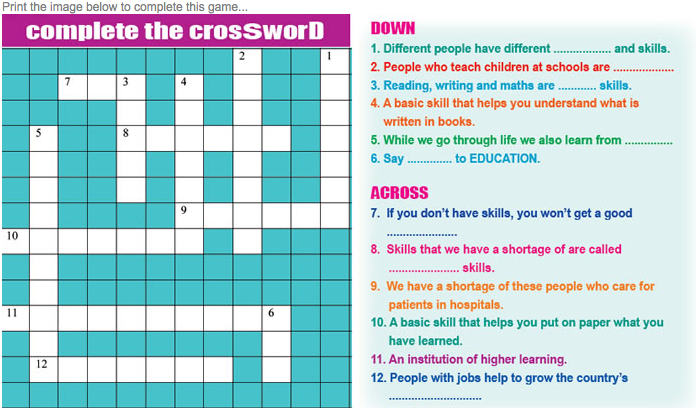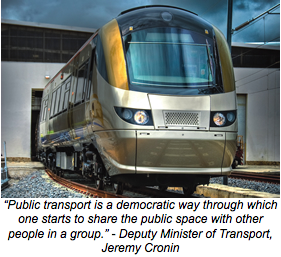Sept/Oct 2010
Sept/Oct 2010 Estelle GreeffLetters - Give us a piece of your mind
Letters - Give us a piece of your mind sadminWINNING LETTER - Take responsibility for your education
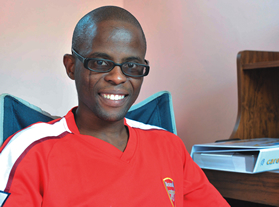 Our matric pass rate has been declining since around 2003. As much as most people blame the Outcomes-based Education (OBE) system, I think students need to take blame as well and take responsibility for their education. How can a student pass when he or she is studying and at the same time listening to an iPod? If it’s not an iPod, its mxit, facebook and other social media networks. The fact is that most students are hooked on these social media networks. I have personal experience, because last year I almost failed my final year of tertiary because of chatting. My advice to parents is to refrain from buying their kids web-enabled phones until the child finishes matric and gets good grades. These are the things that also make it easy to access unsuitable adult material which contaminate their minds while they are still young
Our matric pass rate has been declining since around 2003. As much as most people blame the Outcomes-based Education (OBE) system, I think students need to take blame as well and take responsibility for their education. How can a student pass when he or she is studying and at the same time listening to an iPod? If it’s not an iPod, its mxit, facebook and other social media networks. The fact is that most students are hooked on these social media networks. I have personal experience, because last year I almost failed my final year of tertiary because of chatting. My advice to parents is to refrain from buying their kids web-enabled phones until the child finishes matric and gets good grades. These are the things that also make it easy to access unsuitable adult material which contaminate their minds while they are still young
- Neo Mokgotho, Soweto, Gauteng
Never fail to think
Many young people think that if they come from poor families, they must stay poor for the rest of their lives. Many young people are intelligent, but fail to think what’s best for them. They leave school because they feel that if they finish matric no one will fulfil their dreams. Don’t forget that your future is in your own hands; no one will change your situation but yourself. Education is your parent and a key to success. Stand up and fight for your future because time wasted is never regained.
- Mapara Sylvia Lebogang, Ga-Ramokgopa, Limpopo
Booze is no solution
Alcohol and drugs will not bring any solutions to your challenges. They create problems which were not there before, while hiding the problems you should face. Alcohol and drugs will not solve your problems or give you joy. Soon you will be back to reality and find that you have a hangover, too! It will be easier to face your problems and find solutions when you are sober. Let us be sober as we face life and its challenges.
- Norman Mahlangu Weltevrede, Mpumalanga
Get out of the dark
Dearest and fellow South Africans, our president has started this war against HIV. Let us show our support to him. He was tested in public. We have the rights to be tested in private, yet we are still against the testing process. It is better to know your status sooner than later, so let us get out of the dark and get ourselves tested. Knowing your status will surely lead you to finding better ways to live your life.
- Sandiso Matiwane, Nqamakwe, Eastern Cape
Don’t reject your talents
People are talking about poverty and lack of employment. The problem is that they have been taught to work for other people and not to do things for themselves. People are depending on government for everything, they wait for years to be employed by government or they have babies to get government grants. Every person has a gift or talent, but some choose to reject their talents. If unemployed people can learn to use their talents, they can win the fight against poverty. Government must take all the artworks done by prisoners and sell it to the world.
- Tshepo Lucas Segole, Carltonville, Gauteng
The best gift ever
Having the best mother was the best gift I have ever had in my life. Regardless of being single, she managed to raise us on her own. Regardless of her illiteracy, she laid a foundation of manhood, education and success in my life.
I am determined to complete that foundation in my life and thank her while she’s still alive. I therefore call on all single parents to raise their children in love. However, do not let your singleness deprive your children of education or a future.
- Mothupi Inagane, Amalia, North West
Inspired to do better
Vuk’uzenzele has inspired me to be the best I can be. It has opened lots of opportunities for many people. Every single thing and word you published in your magazine is very useful. I have gained a lot of knowledge and passion about writing ever since I started reading the magazine in 2008 and I’ve been selected to do an internship at a local newspaper.
I have you to thank, you have inspired me to do better. Thank you Vuk’uzenzele!
- Barbara Luvhengo, Nzhelele, Limpopo
A mentor and teacher
Thank you for being my mentor and teacher. Vuk’uzenzele does not only inform us, but educates us as well. As a teenager, I live a very happy life because you teach us about life skills in the magazine. Out of all the magazines we receive, you are number one. Keep on serving and educating the nation. Dankie Vuk’uzenzele!
- Mphou Nando, Thaba Nchu, Free State
My source of information
It’s good to read Vuk’uzenzele magazine and being able to share my views with other readers. It has a lot of information on important topics like health and education.
We were given research about alcohol at school and some students paid money to get the information at the Internet cafe. I consulted my computer called Vuk’uzenzele, which is free of charge, and wrote the best research ever. Thank you for being my computer! .
- Ntomboxolo Priscilla Mzobe, Highflats, KwaZulu-Natal
The World Cup red-carded xenophobia
The World Cup had a positive impact in uniting different countries and nations and seemed to have bridged the divide of xenophobia. It proved that xenophobia is something bad we don’t want to repeat.
They took South Africa out of the World Cup, but they didn’t take the World Cup spirit out of South Africa. That is why we continued to celebrate and attend matches at the stadiums until the last match.
Let us continually take care of each other and our beloved country as we did during the World Cup.
- Vusi April Jiyana, Bundu Inn, Mpumalanga
WRITE TO:
Vuk'uzenzele, Private Bag X745, Pretoria, 0001, or e-mail: vukuzenzele@gcis.gov.za.
If you don't want to have your real name published, you may use a different name, but you must include your real name and address in your letters to us.
PLEASE NOTE:
To win a prize, you must include a physical address and a contact telephone number in letters to us.
Some letters are edited and shortened for publication due to a lack of space.
Heart attacks and strokes - You can reduce your risk
Heart attacks and strokes - You can reduce your risk sadminAdvice
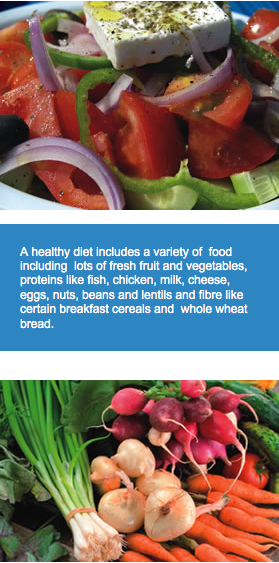 Most heart attacks and stokes can be prevented. A number of unhealthy lifestyle choices make the chances of suffering a heart attack or stroke more likely, but you CAN reduce your risk - eat healthy food, stay active and don’t smoke.
Most heart attacks and stokes can be prevented. A number of unhealthy lifestyle choices make the chances of suffering a heart attack or stroke more likely, but you CAN reduce your risk - eat healthy food, stay active and don’t smoke.
What causes heart attacks and strokes?
Heart attacks and strokes are mainly caused by a blockage that prevents blood from flowing to the heart or the brain. The most common reason for this is a build-up of fatty deposits on the inner walls of the blood vessels that supply the heart or the brain. This makes the blood vessels narrower and less flexible. It is sometimes called hardening of the arteries or atherosclerosis. The blood vessels are then more likely to get blocked by blood clots. When that happens, the blood vessels cannot supply blood to the heart and brain, which become damaged.
Heart attacks and strokes are major killers in all parts of the world, but they can often be prevented.
It is reported that nearly two-thirds of people who have a heart attack die before they can reach medical care. Even when stroke patients have access to modern, advanced treatment, 60% die or are left disabled.
Are you at risk?
Most heart attacks and strokes can be prevented. Research shows that a number of unhealthy lifestyle choices make the chances of suffering a heart attack or stroke more likely. These are called risk factors. The three most important lifestyle habits that put you at risk are:
- smoking and other tobacco use
- unhealthy diet
- lack of physical activity.
These three lifestyle choices can lead to three serious physical problems:
- high blood pressure (hypertension)
- high blood sugar (diabetes)
- high blood fats (hyperlipidaemia).
These are the most important risk factors for heart attacks and strokes. In many parts of the world, tobacco use is on the rise. People are also becoming overweight in many countries as a result of being less active and eating more food that is high in fat and sugar. More and more young people and children are getting diabetes because they are overweight. We owe it to our children to change these lifestyle choices.
How poor lifestyle choices increase the risk
Tobacco smoke is full of substances that damage your lungs, blood vessels and heart. Tobacco takes the place of the oxygen in the blood that is needed by your heart and brain to work properly. Its use greatly increases your chance of having a heart attack or stroke.
Tobacco also causes cancer and lung disease, and harms babies during pregnancy. Inhaling the tobacco smoke of other smokers is as harmful as smoking yourself.
An unhealthy diet is one with:
- food high in calories
- too much fat, sugar or salt
- not enough fresh fruit and vegetables.
If you eat too much and you are not active enough to burn it off, you will put on weight. You could slowly become overweight or even obese (very overweight). Being overweight can lead to diabetes, high blood pressure, and high blood fat levels. All of these physical problems increase the risk of heart attacks and strokes. Obese people are especially at high risk if they have a lot of fat around the waist and stomach area.
An unhealthy diet often contains too much “fast food”, which is high in fat and sugar, and sugar-loaded soft drinks. Fast food is also very high in salt, which increases blood pressure.
Reduce your risk: Eat healthy, nutritious food, don’t smoke and stay active.
Lack of physical activity?
When people do not stay active, their risk of heart attack and stroke increases greatly. Physical activity lowers your risk of heart attacks and strokes by:
- helping your body burn sugars and fats and assisting in keeping a good weight
- lowering your blood pressure
- increasing oxygen levels in your body
- reducing stress
- strengthening your heart muscle and bones
- improving blood circulation and muscle tone.
Staying active also reduces the risk of other illnesses, such as cancer. Active people usually feel better and happier. They are likely to sleep better and to have more energy, self-confidence, and concentration. Walking, gardening, or doing housework for at least 30 minutes every day can help you prevent heart attacks and strokes.
Physical activity lowers your risk of heart attacks and strokes. It doesn't have to be strenuous sport activities, but can include walking, gardening or even doing housework for at least 30 minutes every day.
For more information visit the National Department of Health’s website: www.doh.gov.za
Census 2011 - planning for a better future
Census 2011 - planning for a better future sadmin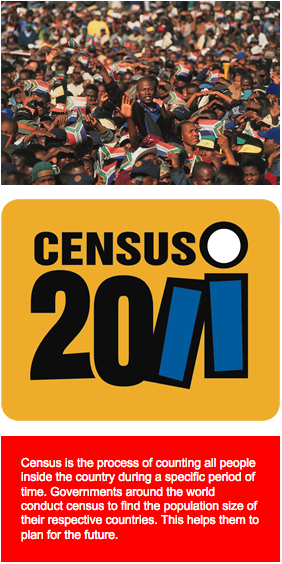 As part of government’s long-term planning for future projects, South Africa’s next census will take place in October 2011. A census is a survey that counts all the members of a population and gets information about them. In South Africa, a census is taken every 10 years.
As part of government’s long-term planning for future projects, South Africa’s next census will take place in October 2011. A census is a survey that counts all the members of a population and gets information about them. In South Africa, a census is taken every 10 years.
The awareness campaign for Census 2011 was launched in October this year to start preparing people for National Census Day on 10 October 2011.
Statistics South Africa (Stats SA), in collaboration with other government departments, will use the opportunity to inform and educate people throughout the country on the meaning and importance of a census.
The campaign will be directed at different sectors of the population. These include learners at schools, students at institutions of higher learning, workers in factories, office workers, and farm workers.
Awareness
The first census after the April 1994 democratic elections took place in 1996. The last census took place in October 2001 when South Africans were counted for the second time as citizens of the new democracy.
During the 2001 census, Stats SA used over 83 000 enumerators (people who do the actual counting on the ground by visiting homes) and over 17 000 supervisors and fieldwork co-ordinators.
Information will be collected on people and households throughout the country even in the deepest rural areas. Questions asked will include things like age, gender, income, language, education level, religion and culture.
Ten years
In the past, government conducted a census every five years, but since 2001, it takes place every 10th year.
Government uses the information from the census to help plan for future projects. These include the building of schools, hospitals, roads and other public infrastructure. Many government departments and municipalities also use information from the census.
Voters’ roll
In addition to government and municipalities, the Independent Electoral Commission (IEC) also uses census information when compiling a common voters’ roll. This is used during elections.
Census 2011 will also show what progress had been made in the economic and social development of the country.
All people, including foreign nationals inside the country for work and study purposes, as well as visiting on the night of the census, are urged to co-operate with the enumerators.
Consumer Protection Act - A fair deal for consumers
Consumer Protection Act - A fair deal for consumers sadmin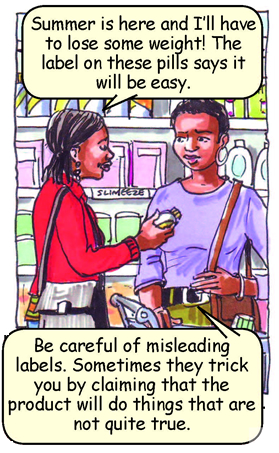 From October this year, the Consumer Protection Act will come into effect to ensure a fairer deal for consumers. The main aim of the Act is to protect people who buy products and services by preventing suppliers from misleading or harming them.
From October this year, the Consumer Protection Act will come into effect to ensure a fairer deal for consumers. The main aim of the Act is to protect people who buy products and services by preventing suppliers from misleading or harming them.
Before we had a Consumer Protection Act, it was difficult for South African consumers to lodge complaints about goods and services they bought. The com
Fair treatment
The Act will help to ensure that consumers are treated fairly when they have problems with the products or services they buy.
It will also enable poor people who have limited education to get better service from suppliers.
In line with the Act, suppliers who do not comply with the Act, may be fined up to R1 million or ten per cent of their annual profit depending on whichever is higher.
A consumer is an individual member of the general public, buying or using goods, property, or services, for pirvate purposes.
Rights
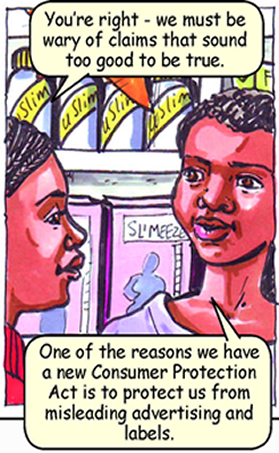 Consumers’ rights under the new Act include the right of equality in the consumer market, the right to privacy, the right to choose, the right to information, the right to fair and responsible marketing, the right to honest dealing and fair agreements, and the right to fair value, good quality and safety.
Consumers’ rights under the new Act include the right of equality in the consumer market, the right to privacy, the right to choose, the right to information, the right to fair and responsible marketing, the right to honest dealing and fair agreements, and the right to fair value, good quality and safety.
For example, one of the provisions of the Act is that suppliers and retailers must make sure that the labels on their products are not misleading. The information on product labels must also be written in plain language so that anyone can understand what it means. This applies to packaging, as well as package inserts.
In line with the Act, consumers will have the right to return goods for a full refund if the labels on products are misleading. The Act also allows ordinary consumers to check products or goods before they buy them.
Advertising
In addition to labels, advertising or marketing of products may not be misleading and must clearly state what the products can be used for. For example the use of words like “healthy” or “pain relief” may be taken as meaning the products in question are of medicinal use.
For more information, call the South African National Consumer Union on 012 4282 7122, or call the dti’s Customer Contact Centre on 08612 8432 384, or send them a fax: 08612 8432 888
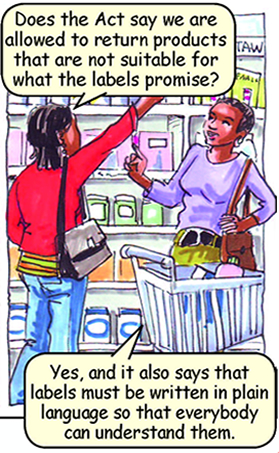
Government to focus on achieving key goals
Government to focus on achieving key goals sadminKeeping it brief
Government will be focusing on achieving selected key goals during the remainder of the year. This follows the findings of the mid-year special Cabinet meeting or Cabinet Lekgotla in July. The purpose of the Lekgotla is to give government an opportunity to review its performance and the carrying out of its Programme of Action following the State of the Nation Address.
 The Cabinet Lekgotla is attended by ministers, deputy ministers, directors-general, premiers and mayors. Ministers were asked to focus on government’s 12 key results which come from the five key priorities. These include education, health, crime, housing, infrastructure development and economic growth, as well as youth development. Progress reported included, among others, free basic services now reaching 74 per cent of the population and free healthcare being provided to children under six years, pregnant and lactating women and people with disabilities. The Schools Nutrition Programme is reaching 5,9 million learners in 18 000 schools and the no-school-fee policy is being implemented.
The Cabinet Lekgotla is attended by ministers, deputy ministers, directors-general, premiers and mayors. Ministers were asked to focus on government’s 12 key results which come from the five key priorities. These include education, health, crime, housing, infrastructure development and economic growth, as well as youth development. Progress reported included, among others, free basic services now reaching 74 per cent of the population and free healthcare being provided to children under six years, pregnant and lactating women and people with disabilities. The Schools Nutrition Programme is reaching 5,9 million learners in 18 000 schools and the no-school-fee policy is being implemented.
Mpumalanga
Parents in the province have been urged to register their children for the 2011 school year before the end of October this year. All schools are required by law to register learners for the 2011 school year from 1 August to 31 October 2010. This applies to both learners re-registering and new applicants. Early registration enables schools and the department to plan its programmes on time to ensure that schooling starts on the first day of school re-opening.
Western Cape
Deputy President Kgalema Motlanthe visited the Eden district in the Western Cape in August to assess progress made in lifting communities out of poverty. The visit forms part of the ongoing campaign to fast-track the delivery of social and municipal services. The campaign of lifting communities out of poverty targets the poorest areas using data from Stats SA to bring urgency and better co-ordination among national, provincial and local government poverty alleviation efforts.
Gauteng
The graves of struggle heroines Charlotte Maxeke, Helen Joseph and Lillian Ngoyi were declared heritage sites in Soweto. According to the Department of Arts and Culture, the declaration of the graves into heritage sites kick-starts a five-year project aimed at identifying sites of women who have made a cultural contribution in different spheres of the liberation struggle including the arts, business and politics.
KwaZulu-Natal
Water and Environmental Affairs Deputy Minister, Rejoice Mabudafhasi, launched the Isipingo Adopt-a-River Project. The project aims to create awareness within communities about the need and importance of protecting water resources. Communities will be empowered with knowledge and skills to enable them to participate in water resource management, make informed decisions and become water ambassadors.
Limpopo
The effects of the changes taking place in the small town of Muyexe in Limpopo through the Comprehensive Rural Development Programme (CRDP) will be felt for generations to come. Thanks to the CRDP, this rural village near the Kruger National Park now has a library, a computer centre and a community hall. The community also has 283 decent houses built specifically for people who didn’t have proper housing. The Muyexe Primary School and the Hatlani High School have also been renovated.
Northern Cape
To help women beyond Women’s month, the Department of Agriculture, Land Reform and Rural Development in the province hosted a summit to Advance Women in Rural Development in Douglas. The aim was to give women in rural areas and farms an opportunity to state what their livelihoods were and how government through its programmes of rural development could improve their status and re-build the moral values in rural and urban areas.
- Information sourced from BuaNews and provincial government websites
For more information, call 1020
Schooling 2025 - action plan to improve education
Schooling 2025 - action plan to improve education sadminEducation empowers
Schooling 2025 is the name of a new action plan by government to improve the education system in schools. It aims to improve all aspects of education such as teacher recruitment, learner enrolment, school funding, mass literacy and numeracy and overall quality of education.
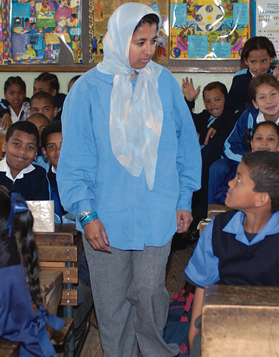 Learners are currently taught on the Outcomes Based Education system known as OBE. This system will be revised, improved, revamped and renamed as Schooling 2025.
Learners are currently taught on the Outcomes Based Education system known as OBE. This system will be revised, improved, revamped and renamed as Schooling 2025.
This means OBE will not be completely scrapped, but will be changed to improve the performance of learners.
Turnaround
The Department of Basic Education is also finalising a comprehensive turnaround plan for teaching in schools called: Action Plan 2014: Towards the Realisation of Schooling 2025.
Mother tongue
The new curriculum gives learners the option of learning in their mother tongues for the first three years of their schooling.
English will still be taught, but will not replace the mother tongue or home language in the early grades.
Help for teachers
Each grade will have its own programme of study. This will ease the workload on teachers and allow learners to focus on specific projects and assessments.
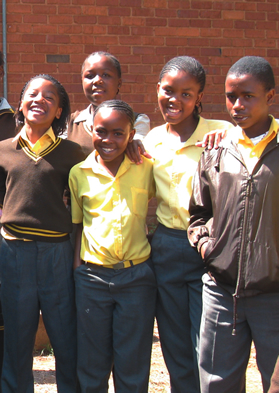 The number of subjects will also be reduced from eight to six for learners in the intermediate phase. This means that for learners in Grades 4 to 6, Technology will be combined with Science; Arts and Culture will be combined with Life Orientation; and Economic and Management Sciences will only be taught to learners from Grade 7.
The number of subjects will also be reduced from eight to six for learners in the intermediate phase. This means that for learners in Grades 4 to 6, Technology will be combined with Science; Arts and Culture will be combined with Life Orientation; and Economic and Management Sciences will only be taught to learners from Grade 7.
Improve literacy
In 2008, the Department conducted a research study, which showed that only 38 per cent of learners could read and count by the time they were eight years old.
One of the main aims of the Schooling 2025 curriculum is to improve learner’s literacy and numeracy. To make this possible, standard lesson plans to improve literacy and numeracy have been developed for Grades 1 to 6.
“Our overarching priority is to bring about a fundamental change in schooling outcomes.” – Ms Angie Motshekga, Minister of Basic Education
Assessment
From next year, learners’ end-of-year results will be calculated as follows:
- Grades R to 3 will be based on 100 per cent continuous assessment of work done throughout the year.
- Grades 4 to 6 will be based on 75 per cent continuous assessment and 25 per cent year-end exam results.
- Grades 7 to 9 will be based on 40 per cent continuous assessment and 60 per cent year-end exam results.
- Grades 10 to 12 will be based on 25 per cent continuous assessment and 75 per cent year-end exam results.
Workbooks
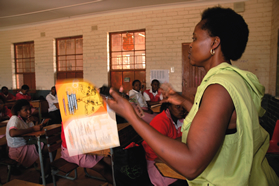 One of the key priorities of Schooling 2025 is to develop and distribute proper learning and teaching materials, especially learner workbooks. The department aims to place workbooks in the hands of each and every learner in the system.
One of the key priorities of Schooling 2025 is to develop and distribute proper learning and teaching materials, especially learner workbooks. The department aims to place workbooks in the hands of each and every learner in the system.
To achieve this, the Department of Basic Education has a plan in place to develop workbooks for Grades 1 to 6.
Experts
The development of the workbooks will be done internally by the Department with the help of a team of curriculum experts, materials developers and translators.
Workbooks will be distributed to more than six million learners and 180 000 teachers in about 20 000 schools. They will be available for use in all schools by 2011.
Meaning of words:
- Continuous assessment: activities and work done by learners throughout the year are evaluated (assessed) on an ongoing basis
- Curriculum: The material to be learned (different subjects) and the process of learning (the actions, methods and resources involved in teaching and learning) offered at schools.
- Mother tongue: The first language learned by children in their homes, which has been passed on from one generation to the next. Also referred to as ‘home language’ or ‘first language’.
For more information on Schooling 2025, call the Department of Basic Education on 012 357 3000.
Let's support the class of 2010
Let's support the class of 2010 sadminEducation empowers
Learners throughout South Africa are preparing to write their National Senior Certificate examinations. To raise awareness of the importance of the exams and rally support for learners, the Department of Basic Education started a campaign called Let’s Support the Class of 2010. So let us all as parents, guardians, siblings, friends give our heartfelt support to them during the coming exams.
The Grade 12 examinations are extremely important, as these results must be presented when learners apply for acceptance at tertiary institutions and for bursaries or jobs.
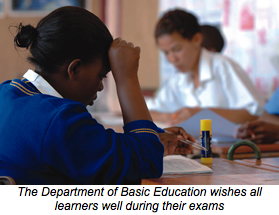 Most schools offer examination preparation, revision and extra classes during weekends and after school. Every learner should attend these and not miss any school days before the exams.
Most schools offer examination preparation, revision and extra classes during weekends and after school. Every learner should attend these and not miss any school days before the exams.
Manage your time
To help you manage your time better, you should work out a study timetable. The timetable should be made up of how much study time is set aside for each subject.
You must stick to fixed study times every day so that studying becomes part of your daily routine. Each subject should be separated into different sections and should be covered thoroughly during study time. Make notes and summaries of key information to help you remember what you have learned.
Study material
Make sure that all your study materials, such as class notes, worksheets, textbooks and stationary are in order. If anything is missing or incomplete, ask a classmate or teacher for help with notes that you do not have.
To get a better understanding of the type of questions that will be covered in the exams, you should go through past years’ exam papers for each subject. This is very useful for exam preparation.
Refresh your mind
Find a quiet place to study, like a school or community library, so you are not easily distracted.
Get enough sleep, drink lots of water and eat healthy snacks and balanced meals to keep you awake, give you energy, and help you to concentrate.
Avoid junk food and greasy foods. These tend to make you feel tired and sleepy, which will affect your ability to concentrate. Take short breaks during study time to refresh your mind.
1 Goal: Education for all!
1 Goal: Education for all! sadminEducation empowers
To millions of people around the world, the 2010 FIFA World Cup will be remembered as the beginning of the biggest global education campaign ever. As part of the 2010 World Cup legacy, the 1 Goal Education for All campaign is bringing together footballers, fans, charities, corporations and individuals to help achieve its aim of quality education for everyone.
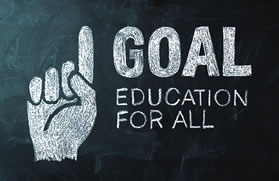 Millions of children in Africa and worldwide are still not enjoying their right to education. About 60 per cent of them are girls. These children can’t go to school for a number of reasons, including illness such as HIV and Aids, disability and poverty. In addition, millions of adults also lack basic literacy skills.
Millions of children in Africa and worldwide are still not enjoying their right to education. About 60 per cent of them are girls. These children can’t go to school for a number of reasons, including illness such as HIV and Aids, disability and poverty. In addition, millions of adults also lack basic literacy skills.
Forum
1 Goal aims to recruit tens of millions of supporters through a mass sign-up campaign to help ensure education for all children globally. This will be done by urging governments to give more aid to education, promoting greater investment for more teachers, textbooks and schools in developing countries and highlighting the importance of sending children to school.
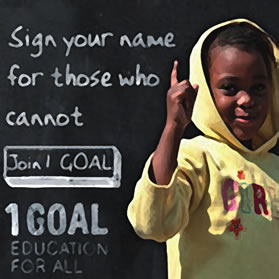 The 1 Goal campaign forms part of the Education for All (EFA) goals of the World Education Forum. The first EFA meeting took place in 2000 in Dakar, Senegal (West Africa). Here, members of the international community committed themselves to ensuring access to quality basic education for all children, young people and adults by 2015.
The 1 Goal campaign forms part of the Education for All (EFA) goals of the World Education Forum. The first EFA meeting took place in 2000 in Dakar, Senegal (West Africa). Here, members of the international community committed themselves to ensuring access to quality basic education for all children, young people and adults by 2015.
Summit
On 11 July, the final day of the 2010 World Cup, the South African government hosted a 2010 FIFA World Cup Education Summit in Pretoria. The summit was attended by heads of state and important world leaders, as well as ambassadors for the 1 Goal campaign. They include well-known actors, football stars and other famous celebrities.
The aim was to renew the commitment made 10 years earlier in Dakar and to build on what has already been achieved.
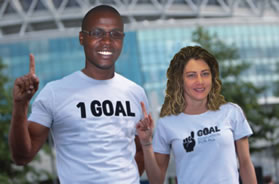 The Pretoria Summit resolved to ensure that learners would leave school with the necessary learning and life skills to enter adult life and the work force.
The Pretoria Summit resolved to ensure that learners would leave school with the necessary learning and life skills to enter adult life and the work force.
Why education for all?
Education for all is vitally important because it:
- Develops people by giving them skills and knowledge to help them reach higher goals
- empowers people to improve their lives, especially women
- fights poverty and helps to grow the country’s economy by increasing employment opportunities
- reduces the chances of getting HIV and Aids
- improves the health of mothers and babies
- enables families to cope better with illness, for example, a child born to a literate mother is 50 per cent more likely to survive past the age of five years.
For more information or to join the campaign, visit: www.join1goal.org/1GOAL.php
Let us learn
Let us learn sadminEducation empowers
Kha Ri Gude means “let us learn” in Tshivenda. It is also the name of a mass literacy campaign that aims to teach 4,7 million adults above the age of 15 years to become literate and numerate. Since 2008, the campaign has helped to create about 75 000 short-term jobs by equipping almost a million learners with literacy skills.
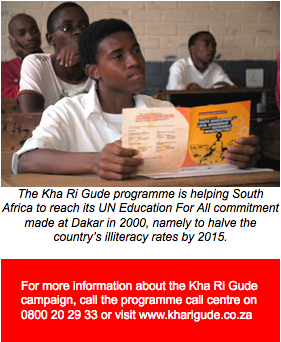 Kha Ri Gude is a government programme that teaches adults to read, write and calculate in their mother tongue and to learn spoken English. The programme plays a major role in easing poverty by equipping illiterate adults with skills to help them find jobs. It also provides volunteer teachers from the poorest communities with a small income for teaching the classes.
Kha Ri Gude is a government programme that teaches adults to read, write and calculate in their mother tongue and to learn spoken English. The programme plays a major role in easing poverty by equipping illiterate adults with skills to help them find jobs. It also provides volunteer teachers from the poorest communities with a small income for teaching the classes.
Who can attend?
Kha Ri Gude is available to all adults, as well as young people over the age of 15 who have little or no education. Learning materials have been specifically designed to teach reading, writing and numeracy and include themes and life skills. It has also been adapted for use in Braille in eleven languages, and for use by the deaf.
Who are the teachers?
The programme uses volunteer teachers. They are usually from poor communities and earn a small income for their services. They get support from supervisors who, in turn, get support from coordinators. Volunteers also help to raise awareness of the programme.
What does it cost and where are classes held?
Classes are free wherever there are groups of about 15 people who want to attend. They are held in communities at times that suit the learners and at places that are easy to reach. It can be at community centres, church halls, private homes or even in prisons.
How long does it take?
Learners are required to commit themselves to attend classes for 240 hours over a period of about six months. Classes take place three times a week and learners are urged to attend all the classes regularly to graduate.
Will I get a certificate?
Kha Ri Gude is a Department of Education programme and the department will give certificates to people who successfully finish the programme.
What about vulnerable groups?
The Kha Ri Gude Campaign makes specific efforts to target vulnerable groups. These include illiterate women and youth, people with disabilities and people older than 60. Currently, 80 per cent of the learners are women, eight per cent are disabled, 25 per cent are youth and 20 per cent are above the age of 60.
Kha Ri Gude provides blind learners with a range of learning materials including Braille boards (writing boards) and Perkins Braillers (Braille typewriters) for use in class. Learner packs for the blind include a full set of materials in Braille and a talking calculator. The large-scale printing of Braille materials is made possible by Kha Ri Gude owning one of the two high-bulk printers available in South Africa.
How can we help you choose a career?
How can we help you choose a career? sadminEducation empowers
What do you want to be when you grow up?” This is a question children hear from a young age. Making a career choice is one of the most important decisions a learner makes. It is therefore very important that learners have the necessary information and advice before deciding what they want to do. The Department of Higher Education is going all out to help young people make the right choices.
 As part of the Mandela Day activities in July this year, the Department of Higher Education and Training, launched a Career Guidance Campaign in Giyani, Limpopo. The Campaign is aimed at giving information about post-school options to high-school learners in rural areas.
As part of the Mandela Day activities in July this year, the Department of Higher Education and Training, launched a Career Guidance Campaign in Giyani, Limpopo. The Campaign is aimed at giving information about post-school options to high-school learners in rural areas.
Rural areas
More than 1 000 high school learners received information and advice. This included different opportunities for higher learning and skills development to help them make a career choice best suited to their abilities and interests.
Community service
During the launch of the campaign, a number of personalities and prominent South Africans pledged to serve their 67 minutes of community service for Mandela Day by providing career advice to high school learners.
The Department of Higher Education and Training aims to encourage people in the higher education and training sector, as well as other professionals to assist high school learners with information. This includes information on universities and colleges, course programmes, financial aid, bursary schemes and training opportunities.
Prepare for life
Information and guidance about the range of post-school opportunities will help learners to better prepare for life after school and lead to less drop-outs and improved employment prospects.
After finishing matric, many young people must choose a career path. To help them, the South African Qualifications Authority (SAQA), which is part of the Department of Higher Education and Training, started a career helpline in July this year.
All ages
Although the helpline is aimed at young people seeking career and study advice, it is also open to people of all ages who need career advice. These include learners who have to choose school subjects, school leavers wanting to study further, or working people wanting to switch to different careers. A team of trained career guidance counsellors is in place to help them.
Resource
In addition, the helpline is also a resource for career guidance counsellors or anyone else who provides career advice to learners. The helpline is based on a lifelong learning framework and on the values of equal opportunity and social justice.
You can contact the team of career guidance counsellors at the Career Advice Helpline by phone, SMS, website, e-mail, letter, or in person. Tel: 086 0111 673; e-mail: help@nqf.org.za website: http://www.nqf.org.za Postal Address: Postnet Suite 248 Private Bag X06 Waterkloof, 0145
Getting on board the technology train
Getting on board the technology train sadminEducation empowers
Schools throughout the country have jumped on board the technology train with the roll-out of the Teacher Laptop Initiative. The initiative allows teachers to use a laptop to gather information, share ideas and learn from each other to improve the quality of education in classrooms.
 Modern technology and especially computers have become a part of our daily lives. It is therefore only natural that computers should start being used in classrooms as a teaching tool.
Modern technology and especially computers have become a part of our daily lives. It is therefore only natural that computers should start being used in classrooms as a teaching tool.
The Teacher Laptop Initiative is part of the Education Labour Relations Council and the Basic Education Department’s Quality Learning and Teaching Campaign. The aim is to improve the overall quality of education by making resources available to learners and teachers.
What is a laptop?
A laptop is a portable computer that can be used anywhere because it is small and works with batteries. It can fit on your lap and you can carry it in a briefcase.
Teaching tool
The goal is to ensure that every teacher owns a laptop and knows how to use it in the classroom. This will improve teachers’ skills and transform learning in classrooms.
Teachers throughout the country, who have already signed up for the laptop initiative have received training on computer literacy. They were taught how to connect to the Internet, how to search and gather information and how to use the Internet and various software packages.
Allowance
Teachers who sign up for the initiative will have a choice of different laptop packages. These include administration materials, the national curriculum and Internet connectivity, which have been approved by the department.
Teachers who are part of the initiative, will receive a monthly allowance to contribute to the cost of the laptop and Internet connection.
What are the benefits of the laptop initiative?
By using laptops as a teaching tool, teachers are able to access information quickly. They will also be able to receive information directly from the department.
Classrooms will become more interactive. It will encourage learner participation in class while making learning more fun.
Information and communication technology will be introduced to learners.
Lesson preparation, plans, tasks and projects can be improved.
Schools and teachers will be able to improve planning, management and administration.
For more information visit www.teacher-laptop.co.za or call the Education Labour Relations Council on 012 663 7446, or the Department of Basic Education on 012 357 3000.
Achieve your dream with a bursary or loan
Achieve your dream with a bursary or loan sadminEducation empowers
Many children dream of becoming doctors, nurses, teachers or lawyers and making a difference in their societies. To achieve these dreams they will need to study and further their education. However, studying at a tertiary institution costs a lot of money and many parents cannot afford it.
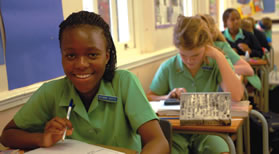 To help hard-working and determined young people to realise their potential and achieve their dreams, funding is available from government‘s National Student Financial Aid Scheme (NSFAS). It helps needy students with financial aid in the form of bursaries or loans.
To help hard-working and determined young people to realise their potential and achieve their dreams, funding is available from government‘s National Student Financial Aid Scheme (NSFAS). It helps needy students with financial aid in the form of bursaries or loans.
Students who apply for financial aid may be granted a full or partial bursary. This means that a student may be granted a bursary, which covers all or only half their tertiary fees. To cover the remaining half, families can apply for an additional loan. The amount of money you will get depends on your Grade 11 exam results and your family’s income or financial situation.
You will have to go through a Means Test, which will assess your family’s financial situation to see whether you qualify for financial
aid. Your family may have to make a contribution depending on their income. The rest of the funds needed may be provided through a loan from NSFAS, or you may qualify for one of the bursaries administered by NSFAS.
Many tertiary institutions and private companies offer bursaries, but you have to apply well in advance to avoid missing the deadlines.
Funza Lushaka Bursary Programme
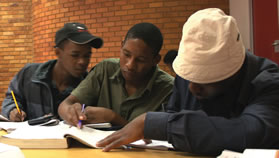 If you are interested in studying for a Bachelor of Education degree or a Post-Graduate Certificate in Education (PGCE), the Department of Education offers the Funza Lushaka Bursary Programme. Students who are interested to apply for this bursary and are successful,
If you are interested in studying for a Bachelor of Education degree or a Post-Graduate Certificate in Education (PGCE), the Department of Education offers the Funza Lushaka Bursary Programme. Students who are interested to apply for this bursary and are successful,
will be required to teach in a provincial education department for the same number of years they received the bursary.
The bursary covers tuition fees, residence or approved accommodation and meal costs, books and learning material allowance and a monthly allowance for living expenses. For more information visit http://www.funzalushaka.doe.gov.za/.
The Department of Trade and Industry (dti)
The dti offers the following bursaries for five applicants for 2011.
- BCom Economics: You will need a level 5 or between 60 and 69% in English and Mathematics.
- BCom Econometrics: You will need a Level 5 or between 60 and 69% for English and a Level 6 or between 70 and 79% for Mathematics.
- BCom Accounting: You will need a Level 5 or between 60% and 69% for Mathematics and a Level 6 or between 70% and 79% for English.
- BCom Statistics: You will need a Level 5 or between 60-69% for English and a Level 6 or between 70% and 79% for Mathematics.
To apply you must be a South African citizen and you must have the following: a copy of the admission letter to a tertiary institution where the above fields of study are offered, a completed bursary application (it can be found on www.thedti.gov.za), ID photos and certified copies of certificate/exam results.
Post all these documents to: Mr Norman Hlungwani, Department of Trade and Industry, Private Bag X84, Pretoria, 0001.
Send all these documents to:
Mr Norman Hlungwani,
Department of Trade and Industry,
Private Bag X84, Pretoria, 0001.
The closing date for applications is September 2010.
For more information, call 012 394 3423 or e-mail NHlungwani@thedti.gov.za
How to apply for financial aid
- Get an application form from the tertiary institution you plan to study at and apply for your field of study.
- You can only apply for financial aid once you are accepted at the institution.
- Visit a financial aid officer or the student support centre at the institution to apply. The staff will explain what kind of financial aid you can qualify for and will tell you which documents must accompany your application form, for example your exam results, ID book, birth certificate etc. It can also include parents’ salary slips, a list of income and expenses, and some other certified documents.
Apply well in advance for 2012
Many bursary application dates for Grade 12 learners wishing to study in 2011 have already closed. So, if you are in Grade 11, now is the time to start planning to apply for bursaries for your chosen field of study in 2012. The following companies offer bursaries for 2012. You will need to apply in 2011 to begin studying in 2012.
Vodacom
Vodacom offers bursaries in Information Technology, Information Systems, Computer Science, Electrical or Electronic Engineering and Computer Engineering.
Applicants must be citizens or permanent residents of South Africa. They must get a C symbol or higher for Mathematics and Physical Science (Higher Grade) in Matric. Applicants who plan to study at a University of Technology, must have a Level S for Maths and Science and those applying to study at Universities must obtain a Level 6 for Maths and Science.
For more information, contact Career Wise on 011 484-7505 or www.careerwise.co.za.
Old Mutual
Old Mutual offers bursaries for the following: Accounting and Actuarial Science. The Accounting Bursary covers full costs of tuition, residence fees and book allowance at the University of Cape Town and Stellenbosch University. You will need to obtain a 60 per cent or a level 5 for Mathematics and English. Applicants will need to commit to the CA Training Programme and once graduated will have to work for Old Mutual for a specific period of time.
The Actuarial Bursary covers all tuition costs, accommodation, meals, book allowance, travel allowance and lots more incentives. You will need an A or B grade for Mathematics and all grades to apply.
For more information Contact Babalwa Mgoduka on 021 509 2656.
For more information on the National Student Financial Aid Scheme (NSFAS), contact the university or college where you have been admitted for further study.
Giving 67 minutes of service
Giving 67 minutes of service sadminMandela Day
"It is in your hands to create a better world for all who live in it." - Nelson Mandela
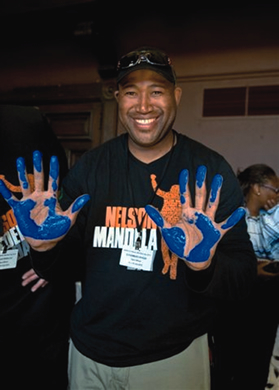 On 18 July, Nelson Mandela celebrated his 92nd birthday. Mandela’s birthday has now officially been declared “Nelson Mandela International Day” by the United Nations.
On 18 July, Nelson Mandela celebrated his 92nd birthday. Mandela’s birthday has now officially been declared “Nelson Mandela International Day” by the United Nations.
The day is an annual celebration of Nelson Mandela’s life and the values he embraced. These include democracy, equality, reconciliation, diversity, responsibility, respect and freedom.
Global call to action
It is a global call to action for people to make their own positive imprint on the world. It is one day in the year that people across the globe stand together to serve the communities around them and work towards a better future. The overall goal is to carry out the message of Mandela Day every day of the year.
Helping others
The Mandela Day campaign message was simple. Nelson Mandela has given 67 years of his life fighting for the rights of humanity. In turn everyone both young and old was encouraged to give 67 minutes of their time to help others.
Millions of people worldwide jumped on board to honour and celebrate his legacy. Many supported their local charities, built homes in their communities, donated food and cl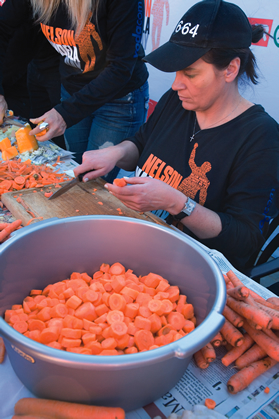 othes to disadvantaged communities and lots more.
othes to disadvantaged communities and lots more.
Messengers on bikes
Among the highlights of Mandela Day was a group of 21 motorbike riders left the Nelson Mandela Foundation on a six-day road trip from Johannesburg to Cape Town to spread the Mandela Day message.
Planting the seeds
The bikers included International Actor Morgan Freeman, local actors and celebrities, business people and sports stars.
Their goal was to be messengers on a journey throughout the country to plant the seed of Madiba’s values at every stop.
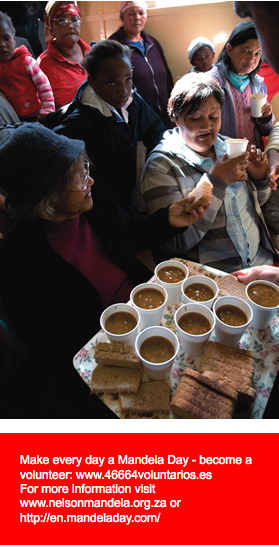
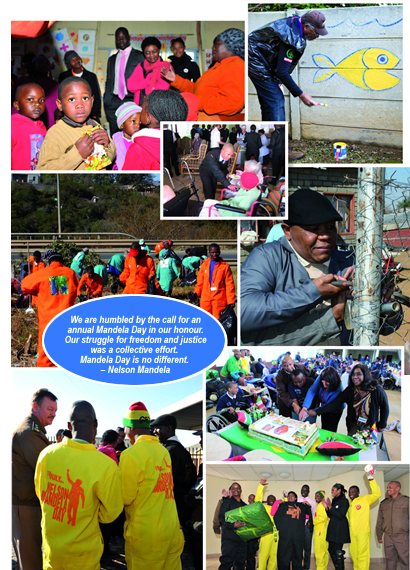
Better transport for future generations
Better transport for future generations sadmin2010 World Cup legacy
Many South Africans and visiting football fans, had to use public transport during the FIFA World Cup. They were pleasantly surprised at how efficiently it worked. The country’s improved public transport system has been identified as one of the key legacy projects of the World Cup. This legacy will be enjoyed by generations of South Africans for many years to come.
Public transport formed the backbone of the transport plans for the 2010 FIFA World Cup. Government invested more than R40 billion to ensure a safe, efficient and reliable public transport system for this event.
The investment in public transport infrastructure has been identified as the most important legacy project of the Football World Cup.
Eye-opener
Deputy Minister of Transport, Jeremy Cronin, said the mass use of public transport during the football tournament had been an eye-opener for many. An important element in ensuring the success of the World Cup, was the use of public transport to reduce congestion on the roads and assist fans to arrive in good time for games, he said.
Some problems arose on the first day of the World Cup when many motorists didn’t observe calls to use public transport. This caused traffic jams around the stadium. But after that people acted on government’s calls and traffic flowed smoothly at the other matches and the closing ceremony.
Commitment
Cronin said Government’s commitment to improve public transport had seen a five-fold increase in the budget for transport infrastructure during the past several years.
“This is a start, but we need to build on it. Firstly, there has to be a change of attitude and this past World Cup showed that we can do it,” he said.
Improvements include world-class airports, upgraded railway stations, luxury buses and integrated rapid public transport networks such as the bus rapid transit system.
Host cities
All the host cities had World Cup transport plans with a public transport focus. These were supported by park-and-ride sys2010 World Cup legacytems, as well as park-and-walks. Fans were encouraged to plan their trips to the stadiums, fan parks and public viewing areas well in advance. Integrated Rapid Public Transport Networks such as the Johannesburg Rea Vaya Bus Rapid Transit (BRT) system were in operation and were popular with commuters.
Taxis
Government will continue to invest in public transport infrastructure initiatives to help the minibus taxi industry to transform itself, says Cronin. These initiatives include possible subsidies for minibus taxi operators. The Rea Vaya BRT in Johannesburg is already operated by taxi associations which employed former taxi drivers as bus drivers for the BRT buses.
Building on the best security practices
Building on the best security practices sadmin2010 World Cup legacy
Before the 2010 FIFA World Cup, many people feared that crime would be out of control. But thanks to improved security measures, there was a marked drop in incidents of crime during the tournament. Government has promised to build on the best security practices used during the tournament to safeguard South Africans and visitors in the future.
 Many South Africans, visiting football fans and tourists said they felt safe as they moved around the country at all hours during the World Cup tournament.
Many South Africans, visiting football fans and tourists said they felt safe as they moved around the country at all hours during the World Cup tournament.
The South African Police Force is committed to take forward the best practices and lessons learned during the World Cup to strengthen its crime-fighting programmes.
Minor crimes
More than 3 million football fans attended matches during the 25 match days. Of the 704 crime-related incidents report- ed to the police during this time, the majority were for minor crimes like theft of cellphones.
These incidents were reported within 1,5 kilometres outside the various stadia. In addition to the stadia, a total of 1 270 million fans attended public viewing areas on match days. Inside the public viewing areas, only 76 incidents of crime were reported to the police.
Arrests
The Police Department said a total of 1 002 case dockets were opened and investigated by dedicated police detectives throughout the country. Half of these (558) were finalised by mid-July and more than 440 arrests were made.
Of those arrested, 266 were South African citizens and 181 were foreign nationals.
Skills upgrade
Police Minister, Nathi Mthethwa, said the 44 000 police officers who were appointed specifically for the World Cup, are now working at various police stations to fight crime. Vehicles and other specialised equipment bought specifically for the football tournament are also available to them.
In addition, the Police Department is involved in an ongoing skills upgrade programme for police detectives to ensure that more criminals are convicted.
Co-operation
Mthethwa said the successful securing of the World Cup placed South Africa firmly on the list of tourist destinations.
He said this became possible owing to a committed police force, as well as the support and co-operation from other government departments during the World Cup.
Swift Justice to continue
Working closely with the police, the Justice Department will continue the best practices of World Cup Special Courts.
Justice and Constitutional Development Minister, Jeff Radebe, said the effectiveness of the Special Courts in handing out swift justice during the World Cup gave meaning to the saying: “Justice must not only be done, but must be seen to be done.”
Radebe said the measures which worked during the month-long football tournament must be continued into the future. The 56 dedicated court rooms in the nine host cities consisted of 37 district courts and 19 regional courts.
The courts were set up to hear cases related to the World Cup. The main aim was to avoid delays in handling criminal matters arising from the tournament.
No to xenophobia
No to xenophobia sadminCompliments from visitors to our country during the 2010 FIFA World Cup included the warm and friendly welcome they received from South Africans. Building on this positive feedback, government called on individuals and members of organisations to join hands and say “NO” to xenophobia.
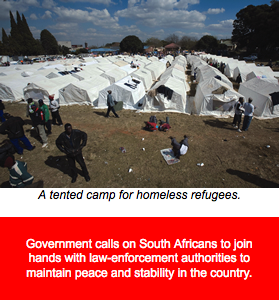 South Africans are well known for their hospitality and spirit of ubuntu. Unfortunately, a handful of people who show intolerance towards foreign nationals can spoil this image.
South Africans are well known for their hospitality and spirit of ubuntu. Unfortunately, a handful of people who show intolerance towards foreign nationals can spoil this image.
For this reason government acted swiftly and is educating the public to help control or prevent outbreaks of xenophobic violence. This followed widespread rumours that foreign nationals were to be attacked immediately after the World Cup ended.
Committee
In May 2008, outbreaks of violence against foreign nationals saw 68 people killed, half of them South Africans. Thousands also lost their homes. To prevent similar incidents of violence against foreign nationals, government restarted the Inter-Ministerial Committee on Xenophobia.
Police Minister Nathi Mthethwa is the chairman of the Inter-Ministerial Committee. In addition to the Police Force, the committee also includes the Departments of State Security, Home Affairs, Cooperative Governance and Traditional Affairs, Basic Education, Social Development, Arts and Culture and International Relations and Cooperation.
Immigration policy
Government said it took the threats as a result of rumours very seriously. It warned that people who were found to be in conflict with the law would be arrested.
Government is also reviewing the development and implementation of the immigration policy. This includes plans to ensure peaceful co-existence between South Africans and foreign nationals in the country.
Hotspots
As in all societies, there are some people who exploit any conditions to cause problems among communities and commit crimes. Some of these people had intimidated foreign nationals to commit common crimes. Government has taken measures to act against them.
To help ensure peace and stability in areas known as hotspots, the security forces patrolled the areas. The police and the South African National Defence Force were put on alert with the instruction not to tolerate any form of violent behaviour by individuals or groups.
United communities
Government calls on anyone who has information about threats or incidents against foreign nationals to report it to the police or community-based organisations.
All South Africans and foreign nationals living in the country are also urged to join in the efforts to build better and more united communities.
Let’s all stand together and continue the spirit of unity and good will created by the World Cup
Highlighting South Africa's liberation heritage
Highlighting South Africa's liberation heritage sadminTourism and Heritage Month
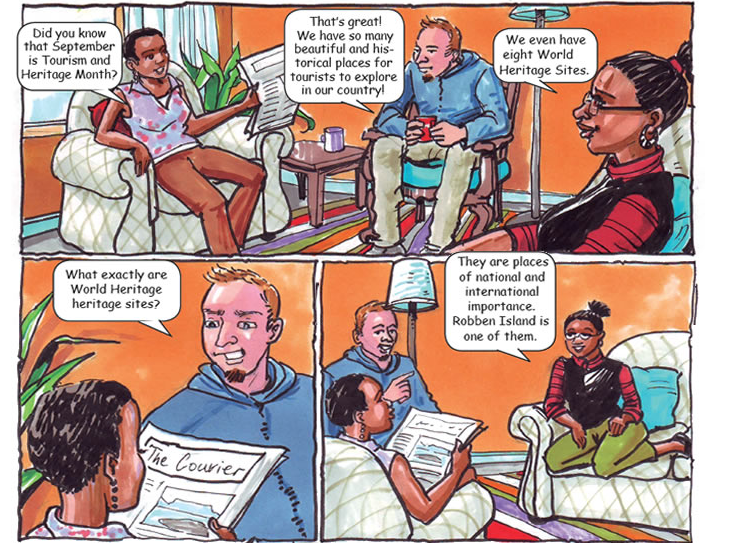
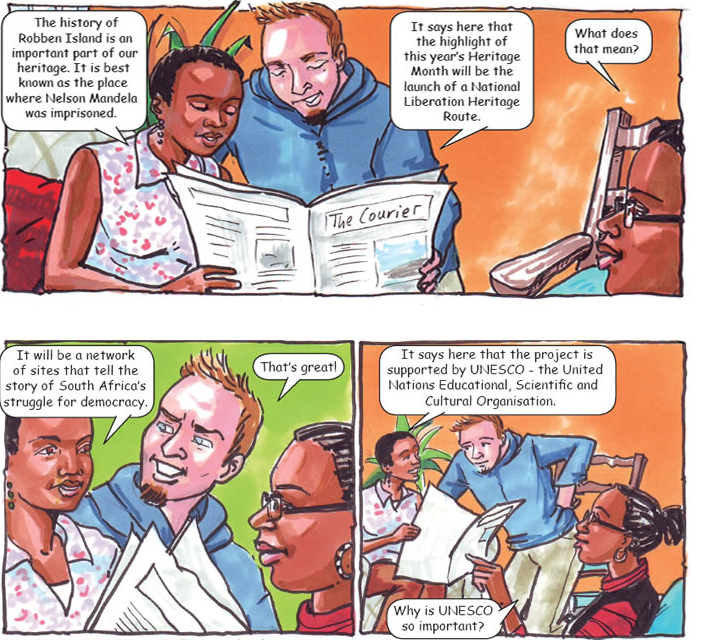
Different and proud of it
Different and proud of it sadminRole model
My life has always been an uphill struggle, says 28-year old, Sheri Brynard from Bloemfontein. But this did not stop her from achieving her goal to become a teacher and work with children. Sheri was born with Down syndrome and from a young age she was a slower learner than most children her age.
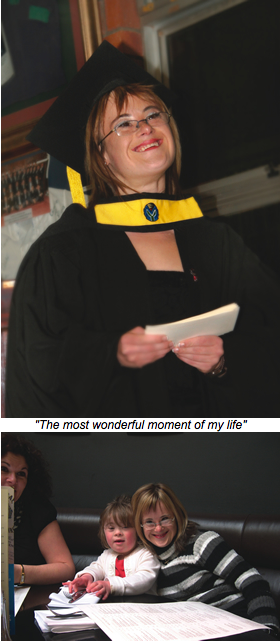 In May last year, Sheri Brynard received her diploma in Educare from the Motheo College in Bloemfontein, making her the first person with Down syndrome to graduate from a tertiary institution in the country.
In May last year, Sheri Brynard received her diploma in Educare from the Motheo College in Bloemfontein, making her the first person with Down syndrome to graduate from a tertiary institution in the country.
“Getting my diploma was not an easy path,” says Sheri. “At school and at college there were only normal children and I looked and learned differently from them. I wanted to fit in, so my mother told me to look at what normal children did and try to do the same.”
There were many times when Sheri didn’t want to be a person with Down syndrome. “I wanted to be able to do all the things my friends and sisters could do.”
"My family and I never focused on my disabilities; we focused on what I could do. I am different and I am proud of that."
Determination
With a lot of hard work and determination Sheri reached her goal. Samona Murugan“Wearing the graduation robe and receiving my diploma was the most wonderful moment of my life. For the first time I was happy being a person with Downs,” says Sheri.
“Now I want to make people with Down syndrome aware of their rights and make them speak out and achieve their potential.”
Inspiration
Sheri says she was inspired by Nelson Mandela. “I felt his courage and strength. He was in jail for 27 years and I have felt like I have been in a jail of my own, because I could not always do or say what I felt.”
After hearing him say, “You are the master of your destiny and the captain of your soul”, Sheri realised that she could not change her circumstances, but she could change the way she looked at them.
Since graduating, Sheri has been a role model for people with and without Down syndrome. She is now an inspirational speaker and motivator and has started the self-advocacy movement in the Free State.
What is Down syndrome?
Down syndrome is a condition in which a child is born with an extra chromosome (chromosomes carry the genetic material of most organisms). Having an extra chromosome affects the way a child develops, both mentally and physically. About 1 in every 800 babies are born with Down syndrome. They usually do not grow their full height and have some health problems, but it varies from person to person. Health problems associated with Down syndrome can be treated. Down syndrome cannot be prevented, but it can be detected before a child is born.
For more information, call 0861 369 672 (0861 DOWNSA) or visit: www.downsyndrome.org.za/
Building to empower women
Building to empower women sadminFocus on the provinces
The National Department of Human Settlements in partnership with Ditsobotla Local Municipality in the North West province and the National Home Builders Registration Council (NHBRC) has launched a project to empower women, called Women’s Build 2010.
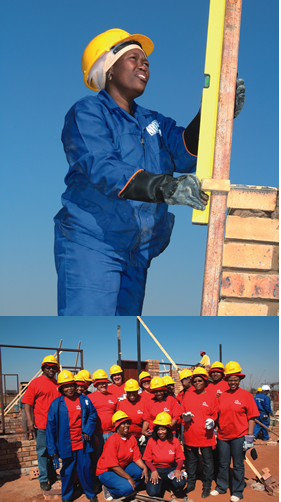 Women’s Build was launched by North West MEC for Human Set- tlements, Desbo Mohono on 24 August. It is a Letsema Project to commemorate the historic 1956 women’s march to the Union Buildings to protest against the apartheid government’s unfair pass laws.
Women’s Build was launched by North West MEC for Human Set- tlements, Desbo Mohono on 24 August. It is a Letsema Project to commemorate the historic 1956 women’s march to the Union Buildings to protest against the apartheid government’s unfair pass laws.
North West province
This year’s building project is hosted in North West province in the Tlhabologang Township of the Ditsobotla Local Municipality.
The Province has allocated 1 956 housing units in five districts to women contractors to commemorate the march.
The beneficiaries of the housing units include elderly people, women-headed households and people with disabilities. Women’s Build will run from August to September.
Support
During the weeks of building activities, 54 housing units where constructed to celebrate the 54th Anniversary of the women’s march. This is part of existing projects of 135 housing units.
Various government departments and agents, as well as stakeholders from the private sector, have pledged their support to partner with the department in creating sustainable human settlements. At least 100 community volunteers participated in the building project.
Granny (109) finally gets a house of her own
Human Settlements Minster, Tokyo Sexwale accompanied by the North West Premier Maurine Modiselle and the provincial MEC for Human Settlements Desbo Mohono, handed over a house to 109-year old Mmami Motlhokwa in Coligny in the Ditsobotla municipality. The house is one of 54 houses constructed as part of the National Women’s Build Programme.
Mmami has never owned a proper house before and has been staying with her children and great grand children in a two-roomed house. She said the secret behind her age was prayer, respect and eating healthy food.
Sexwale appealed to beneficiaries to stop building shacks next to the new houses. “We would like to turn this small area into a proper human settlement where people would live, learn, relax and pray”, he said.
Minister Sexwale delivered a strong warning to contractors who continue to build shoddy houses for the poor and engage in corrupt practices. He said about 2 000 contractors have already been arrested countrywide and their bank accounts have been frozen to allow government to recover its money.
Mohono, said an audit was currently underway in the province to determine the number of houses that were not properly built and which needed to be fixed.
For more information, call the Department of Human Settlements (North West) 0182 3912 0420/211
Eco-friendly product puts bread on the table
Eco-friendly product puts bread on the table sadminFocus on the provinces
Caring for the environment is something most people are aware of, but they either do nothing about it or only do it as voluntary work. A group of Eastern Cape women have found a way to contribute to a better environment, while also earning money to feed their families.
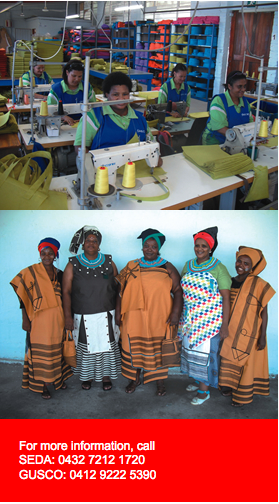 Reaching success has been a long, difficult road for members of the Greater Uitenhage Sewing Co-operative (GUSCO). What started six years ago as three informal groups making school uniforms, has turned into a successful co-operative business.
Reaching success has been a long, difficult road for members of the Greater Uitenhage Sewing Co-operative (GUSCO). What started six years ago as three informal groups making school uniforms, has turned into a successful co-operative business.
GUSCO supplies colourful, re-usable fabric shopping bags to Woolworths. Because the bags are re-usable and made of fabric instead of plastic, they do not pollute the environment. This means they are environment-friendly, or eco-friendly for short.
Fighting poverty
GUSCO has a yearly income of about R2 million and helps to fight poverty by employing more than 30 people.
The co-operative first got funding from local motor assembly company, Volkswagen South Africa (VWSA). VWSA provides the premises where the co-op manufactures its shopping bags, on a lease basis.
The co-op also received some support from the Small Enterprise Development Agency (SEDA) of the Department of Trade and Industry.
SEDA helped the all-women co-operative with business support services, such as registering their business, drawing up a business plan, planning for production, marketing and financial management.
Other than SEDA and VWSA, the co-operative also received help from the Uitenhage Despatch Development Initiative. This is a local organisation focusing on developing SMMEs in the area.
Hard work
Getting the contract to supply the re-usable bags to Woolworths required a lot of hard work as the product had to meet the high standards of this up-market retail store.
Armed with a working business plan, the co-operative was able to get a R500 000 loan from a financial institution. This helped them to buy 22 new sewing machines, which they use to produce almost 8 000 shopping bags a week.
Commitment
Woolworths has been buying environment-friendly shopping bags from GUSCO since 2005. The bags form part of the Woolworths’ commitment to use environment-friendly products. It also shows the company’s commitment to support the development of small and medium-sized businesses.
Apart from Woolworths, which buys 30 per cent of the overall shopping bag production, the co-op also supplies eco-friendly products to other customers.
Supporting learners with special needs
Supporting learners with special needs sadminYouth
The South African National Association for Specialised Education (SANASE) is an association of school governing bodies for special education. The association, which had its annual general meeting in August, plays an important role in education for children living with disabilities.
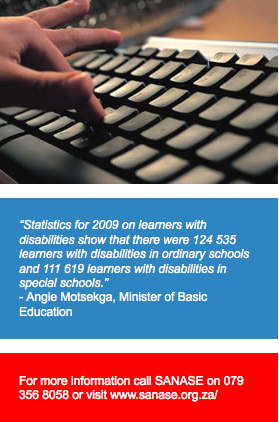 Basic Eucation Minister, Angie Motshekga has thrown her weight behind SANASE. “Our first priority is the future and wellbeing of the learners,” Motshekga said at the SANASE Annual General Meeting held in Cape Town. She noted that government has taken many steps to protect the fundamental rights of children, including children living with disabilities. These include the White Paper 6, Special Needs Education: Building an Inclusive Education and Training System.
Basic Eucation Minister, Angie Motshekga has thrown her weight behind SANASE. “Our first priority is the future and wellbeing of the learners,” Motshekga said at the SANASE Annual General Meeting held in Cape Town. She noted that government has taken many steps to protect the fundamental rights of children, including children living with disabilities. These include the White Paper 6, Special Needs Education: Building an Inclusive Education and Training System.
Wheel chairs
The White Paper (a parliamentary paper explaining government policy on a specific issue) has provided plans for developing a system where children with disabilities can be accommodated into mainstream schools and to increase access to quality education for children with special learning needs.
Government’s plans to help learners with special needs include much-needed equipment like wheelchairs. Equipment have already been distributed to hundreds of children enabling them to access education and to become better integrated into society. For example, many children who could not walk had to be carried around by their parents and could not attend school. They have now been provided with wheelchairs and can attend school.
Sign language
The department has also established a Curriculum Management Team for the development of the South African Sign Language curriculum as a subject. The curriculum is being developed for implementation in 2012.
Looking at ways to involve youth in their communities
Looking at ways to involve youth in their communities sadminYouth
International Youth Day is observed on 12 August each year to promote ways to actively involve young people in making positive contributions to their communities.
On 12 August, the National Youth Development Agency (NYDA) commemorated International Youth Day with the rest of the international community. The agency hosted a round table discussion where representatives from youth structures, non-governmental organisations, students, student formations, and the public and private sector reviewed how far South Africa is in speeding up youth development.
Fast track
High quality education, job creation, initiating skills development programmes, and getting young people to volunteer their services for the benefit of their communities are some of the targets that have been outlined in the African Youth Charter; National Youth Policy and World Youth Programme. “We will take stock of the progress we have made thus far and assess ways we can fast track our plans,” said Andile Lungisa, the NYDA Chairperson.
Challenges
Lungisa said as the largest population group, South African young people should be playing a leading role in contributing towards the South African economy. However, many young women and men are unemployed and have not been able to develop their full potential.
“We will be rallying the support of various stakeholders such as the public and private sector and civil society, because collectively we can make a substantial dent in addressing the challenges faced by young people,” Lungisa said.
Say yes to education!
Say yes to education! sadminFun page
PLEASE NOTE: The games on this page are not competitions. They are only for fun, so don't send your answers to Vuk'uzenzele.
What is education?
Education is the process of learning from a young age up to adulthood to acquire knowledge and skills. Formal education starts in schools where we are taught subjects like science, geography, life skills, history and maths. After school we can go to tertiary institutions like colleges and universities where we study for a diploma or degree. While we go through life we also learn from experience.
Why do we need education?
'We need education because without education we will not be able to get good jobs. Our country also needs educated people with skills to help grow the economy. In South Africa we have a shortage of skilled people in certain fields like doctors, nurses, engineers and technologists - these are called scarce skills.
What are skills?
People have different talents and skills. Basic skills are things like reading, writing and counting. Specific skills are things like computer skills, building, plumbing, teaching or nursing.


